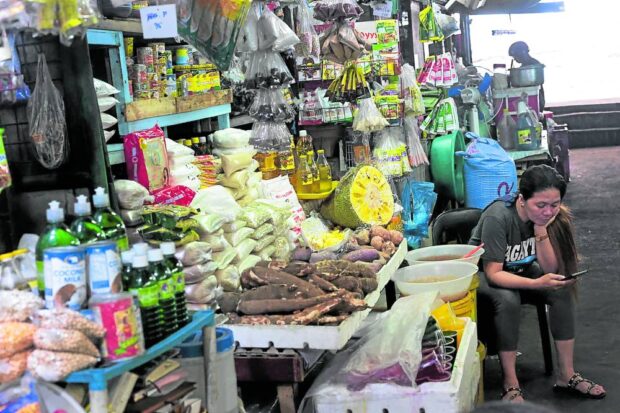March inflation seen to have eased
MANILA -Private-sector analysts expect inflation in the Philippines to have averaged at 8 percent in March, firming up the possibility that interest rate would stop being raised in response.
This consensus forecast is lower than the previous month’s readout of 8.6 percent, but higher than the estimate of the Bangko Sentral ng Pilipinas (BSP).
The BSP is looking at 7.8 percent, give or take 0.4 percentage point (ppt), or a range of 7.4 percent to 8.2 percent.
Tightening pause
For ING Bank, an 8-percent readout in March could allow the central bank to pause at its May policy meeting.
“[BSP] Governor Felipe Medalla hinted that [the] most recent rate hike could be the last for this episode should inflation continue to trend lower,” said the group that is based in The Netherlands.
https://business.inquirer.net/393351/pause-in-bsp-rate-hikes-seen
In February, the BSP raised its overnight borrowing rate by 0.25 percentage point to 6.25 percent.
This was the smallest increase since the Monetary Board raised by as much in June 2022 to bring the policy rate to 2.5 percent.
Between June and February, the policy rate was raised twice by 0.75 ppt and four times by 0.5 ppt.
Goldman Sachs agreed with the consensus forecast, adding that compared to the previous month’s prices, growth in March was also slower at 0.3 percent compared to 0.4 percent in February.
The slower sequential, seasonally adjusted inflation is “mainly due to lower vegetable and fish prices offset partially by higher electricity costs,” the American group said in a commentary.
Security Bank Corp. also forecasts at 8 percent, noting that the food group of commodities remained the prime contributor, although food prices have also been easing slightly.
“Transport [costs are] also expected to have tempered, but these may be offset by slightly higher prices in utilities, with [Manila Electric Co.] increasing its charges for the month [of March],” Security Bank chief economist Robert Dan Roces said.
Roces said that with the next policy meeting in May as there is none set in April, the central bank will have two months’ worth of data to consider as to its next move.
“We do think it has done much of the heavy lifting, and monetary policy can only do so much,” he said. “Thus, we think there is a higher chance that it may decide to pause at the current policy rate.”
https://business.inquirer.net/391410/bsp-seen-holding-off-on-further-rate-hikes
Roces was echoing Finance Secretary and MB member Benjamin Diokno, who reiterated on Tuesday that he believed the central bank’s governing body had done enough raising rates and that it’s time for a pause in the next meeting.
“Considering the BSP’s forecast [for the March print], I would say, yes, inflation has peaked,” Diokno said.
Pantheon Macroeconomics also expects inflation to have slowed down further in March, although its forecast is higher at 8.2 percent.
“This should be led largely by faster disinflation in transport,” the United Kingdom-based group said.
In a press briefing, Diokno said the Marcos administration is equipping itself better in addressing high inflation with the recent creation of an Inter-agency Committee on Inflation and Market Outlook (IAC-IMO).
https://business.inquirer.net/389812/philippine-govt-forms-inter-agency-on-inflation-market-outlook
The committee is in charge of closely monitoring the main drivers of inflation, assessing the supply and demand of essential food commodities, monitoring external and internal shocks, facilitating data-sharing among concerned agencies, and providing timely recommendations to curb price spikes.
To provide additional information on the local production of key commodities, the IAC-IMO will be tapping advanced technologies to complement traditional modes of data and analysis.
These include remote sensing and satellite imagery as well as data science, among others.
“This is an attempt to put science in controlling inflation,” Diokno said. “We want to introduce science into decision making and that’s what we’re going to do.” INQ
